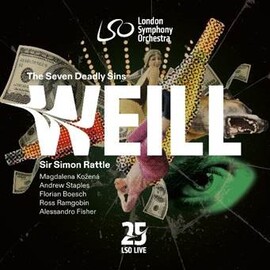Mit ihrer Mischung von Stilen, oft marschartigem und sprödem Klang ist die Musik von Kurt Weill keine, die sich dem Ohr anschmiegt, ganz abgesehen von provozierenden Inhalten wie bei den ‘Todsünden’ oder auch ‘Vom Tod im Wald’. Aber gerade diese einmalige Sonderheit der Werke des Busoni-Schülers bietet auch das Reizvolle.
Die Kantate ‘Vom Tod im Wald’ und ‘Die kleine Dreigroschenmusik’, eine eigene Komposition in Nähe zur Dreigroschenoper, entstanden noch in Deutschland. Die Ballettmusik ‘Die sieben Todsünden’ wurde in Paris komponiert, bevor die Flucht vor den Nationalsozialisten den Komponisten in die USA führte, wo dann ‘Street Scene: Act I, Lonely House’ und ‘Four Walt Whitman Songs’ geschrieben wurden. Vier der Werke sind für Stimmen und Ensemble, die Dreigroschenmusik nur für Instrumente gesetzt.
Das London Symphony Orchestra und Simon Rattle geben diesen Aufnahmen mit markant ausgeformten, aber immer gepflegtem Spiel genau die Färbung und Stringenz, die die Musik benötigt, um ihren Charakter voll zu entfalten. Verschmitzt Süffisantes steht neben streng rhythmisch Pointiertem, Kneipenambiente neben Konzertsaalatmosphäre.
Magdalena Kozena in der Rolle der Anna bei den Todsünden sowie die Sänger dort und in den anderen Stücken komplettieren diese erfrischend charmante Sicht auf die Auswahl von Stücken von Kurt Weill. Allen gemein ist, dass die Aussprache klar und weitgehend frei von Akzenten gelingt. Ihre Stimmen bilden die Charaktere mit hochprofessioneller Umsetzung an, die aber jegliche opernhaft angehauchte Ausformung vermeidet, so dass sie dem Stil gemäß agieren. Mit ‘Vom Tod im Wald’ und ‘Kleine Dreigroschenmusik’ gelingen zudem überzeugende Bereicherungen des Katalogs.
Das dreisprachige Beiheft komplettiert mit den Libretti, bei den deutschen auch in englischer Übersetzung, Informationen zu Weill und den Werken sowie den Interpreten eine hilfreiche Handreichung, um das Gehörte noch besser einzuordnen. Die Aufnahme eines Konzertes lässt auch hinsichtlich der Aufbereitung keine Wünsche offen.
With its mixture of styles, often march-like and brittle sound, the music of Kurt Kurt Weill’s music is not one that is easy on the ear, quite apart from provocative content such as that of Die Todsünden or Vom Tod im Wald. But precisely this unique peculiarity of the works of the Busoni pupil also offers the charm. The cantata Vom Tod im Wald and Die kleine Dreigroschenmusik, an own composition close to the Threepenny Opera, were still composed in Germany. The ballet music ‘The Seven Deadly Sins’ was composed in Paris, before the flight from the National Socialists led to the USA, where “Street Scene: Act I, Lonely House” and ‘Four Walt Whitman Songs’ were written. Four of the works are for voices and ensemble, while Dreigroschenmusik is for instruments only.
The London Symphony Orchestra and Simon Rattle give these recordings exactly the coloration and stringency that the music needs to fully develop its character, with strikingly shaped but always cultivated playing. The mischievous and sly is juxtaposed with the strictly rhythmic and pointed, the pub ambience with the concert hall atmosphere.
Magdalena Kozena in the role of Anna in Die Todsünden as well as the singers there and in the other pieces complete this refreshingly charming view of the selection of pieces by Kurt Weill. What they all have in common is that their pronunciation is clear and largely free of accents. Their voices form the characters with a highly professional delivery that avoids any operatic touches, so that they act according to the style. Vom Tod im Wald and Kleine Dreigroschenmusik are also convincing additions to the catalog.
The trilingual booklet completes the set with the libretti, in the case of the German ones also in English translation, information on Weill and the works as well as the performers, providing a helpful guide to better understand what has been heard. The recording of a concert also leaves nothing to be desired in terms of presentation.


















